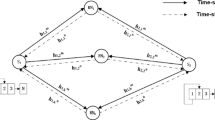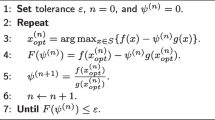Abstract
This paper studies the problem of joint allocation of subchannel, transmission power, and phase duration in the relay-enhanced bidirectional orthogonal frequency-division multiple access time division duplex systems. The challenges of this resource allocation problem arise from the complication of multiple-phase assignments within a subchannel since the relay station can provide an additional signal path from the base station to the user equipments (UEs). Existing research work does not fully consider all the influential factors to achieve feasible resource allocation for the relay-based networks. Since energy consumption is one of the principal issues, the energy minimization resource allocation (EMRA) schemes are proposed in this paper to design the allocation of subchannel, power, and phase duration for the UEs with the consideration of UE’s quality-of-service (QoS) requirements. Both the four-phase and two-phase bidirectional relaying assignments and the network coding technique are adopted to obtain the suboptimal solutions for the proposed EMRA schemes. Different weights are designed for the UEs to achieve the minimization of weighted system energy for the relay-enhanced networks. Simulation results show that the proposed EMRA schemes can provide comparably better energy conservation and outage performance with QoS support.












Similar content being viewed by others
References
van Nee, R., & Prasad, R. (2000). OFDM for wireless multimedia communications. Norwood: Artech House.
IEEE standard for local and metropolitan area networks—Part 16: air interface for broadband wireless access systems, IEEE Standard 802.16-2012 (Revision of IEEE Std 802.16-2009), pp. 1–2542, Aug. 2012.
3GPP TS 36.300. (2009). Evolved Universal Terrestrial Radio Access (EUTRA) and Evolved Universal Terrestrial Radio Access Network (EUTRAN) Overall description; Stage 2, Rel. 9, v9.2.0.
Zhang, D., Wang, Y., & Lu, J. (2010). QoS aware resource allocation in cooperative OFDMA systems with service differentiation. In Proceedings of the IEEE ICC, May 2010.
Kaneko, M., Popovski, P., & Hayashi, K. (2009). Throughput-guaranteed resource-allocation algorithms for relay-aided cellular OFDMA system. IEEE Transactions on Vehicular Technology, 58(4), 1951–1964.
Girici, T. (2009). Joint power, subcarrier and subframe allocation in multihop relay networks. International Journal of Communication Systems, 22(7), 835–855.
Larsson, P., Johansson, N., Sunell, K.E. (2006). Coded bidirectional relaying. In Proceedings of the IEEE VTC, May 2006.
Oechtering, T. J., Schnurr, C., Bjelakovic, I., & Boche, H. (2008). Broadcast capacity region of two-phase bidirectional relaying. IEEE Transactions on Information Theory, 54(1), 454–458.
Feng, M., She, X., & Chen, L. (2008). Enhanced bidirectional relaying schemes for multi-hop communications. In Proceedings of the IEEE Globecom, Nov 2008.
Jitvanichphaibool, K., Zhang, R., & Liang, Y. C. (2009). Optimal resource allocation for two-way relay-assisted OFDMA. IEEE Transactions on Vehicular Technology, 58(7), 3311–3321.
Greentouch. http://www.greentouch.org.
Ict-earth. http://www.ict-earth.eu.
Ya, Y., Cai, X., & Giannakis, G. B. (2005). On energy efficiency and optimum resource allocation of relay transmissions in the low-power regime. IEEE Transactions on Wireless Communications, 4(6), 2917–2927.
Zhou, Z., Zhou, S., Cui, J. H., & Cui, S. (2008). Energy-efficient cooperative communication based on power control and selective single-relay in wireless sensor networks. IEEE Transactions on Wireless Communications, 7(8), 3066–3078.
Joung, J., & Sun, S. (2012). Power efficient resource allocation for downlink OFDMA relay cellular networks. IEEE Transactions on Signal Processing, 60(5), 2447–2459.
Wong, C. Y., Cheng, R. S., Lataief, K. B., & Murch, R. D. (1999). Multiuser OFDM with adaptive subcarrier, bit, and power allocation. IEEE Journal on Selected Areas in Communications, 17(10), 1747–1758.
Alouini, M. S., & Goldsmith, A. (2000). Adaptive modulation over Nakagami fading channels. Wireless Personal Communications, 13(1–2), 119–143.
Ng, D. W. K., Lo, E. S., & Schober, R. (2012). Energy-efficient resource allocation in OFDMA systems with large numbers of base station antennas. IEEE Transactions on Wireless Communications, 11(9), 3292–3304.
Zhuang, J., Jalloul, L., Novak, R., & Park, J. (2009). IEEE 802.16m evaluation methodology document, IEEE 802.16 Broadband Wireless Access Working Group, 802.16m-08/004r5 Std., Jan 2009.
You, L., Song, M., Song, J., Miao, Q., & Zhang, Y. (2008). Adaptive resource allocation in OFDMA relay-aided cooperative cellular networks. In Proceedings of the IEEE VTC, May 2008.
Shor, N. Z., Kiwiel, K. C., & Ruszcayński, A. (1985). Minimization methods for non-differentiable functions. New York: Springer.
Hart, M., & Je Son, J., et al. (2007). Multi-hop relay system evaluation methodology (channel model and performance metric), IEEE 802.16 Broadband Wireless Access Working Group, 802.16j-06/013r3 Std., Feb 2007.
Erceg, V., Hari, K. V. S., Baum, D. S., & Soma, P. (2003). Channel models for fixed wireless applications, IEEE 802.16 Broadband Wireless Access Working Group, IEEE 802.16a-03/01 Std., June 2003.
Acknowledgments
This work was in part funded by the Aiming for the Top University and Elite Research Center Development Plan, NSC 102-2221-E-009-018-MY3, the National Chung-Shan Institute of Science and Technology (CSIST), the Industrial Technology Research Institute (ITRI), and the Telecommunication Laboratories at Chunghwa Telecom Co. Ltd, Taiwan.
Author information
Authors and Affiliations
Corresponding author
Rights and permissions
About this article
Cite this article
Feng, KT., Li, PR., Chang, TS. et al. Energy minimization resource allocation schemes for relay-enhanced OFDMA networks. Wireless Netw 23, 1629–1644 (2017). https://doi.org/10.1007/s11276-016-1237-8
Published:
Issue Date:
DOI: https://doi.org/10.1007/s11276-016-1237-8




